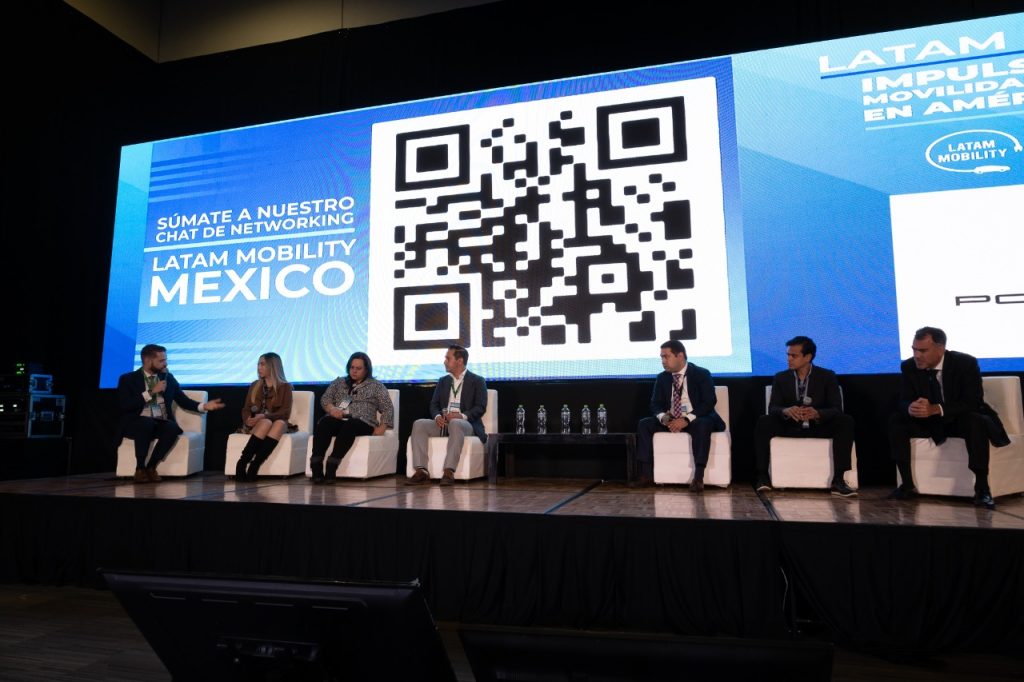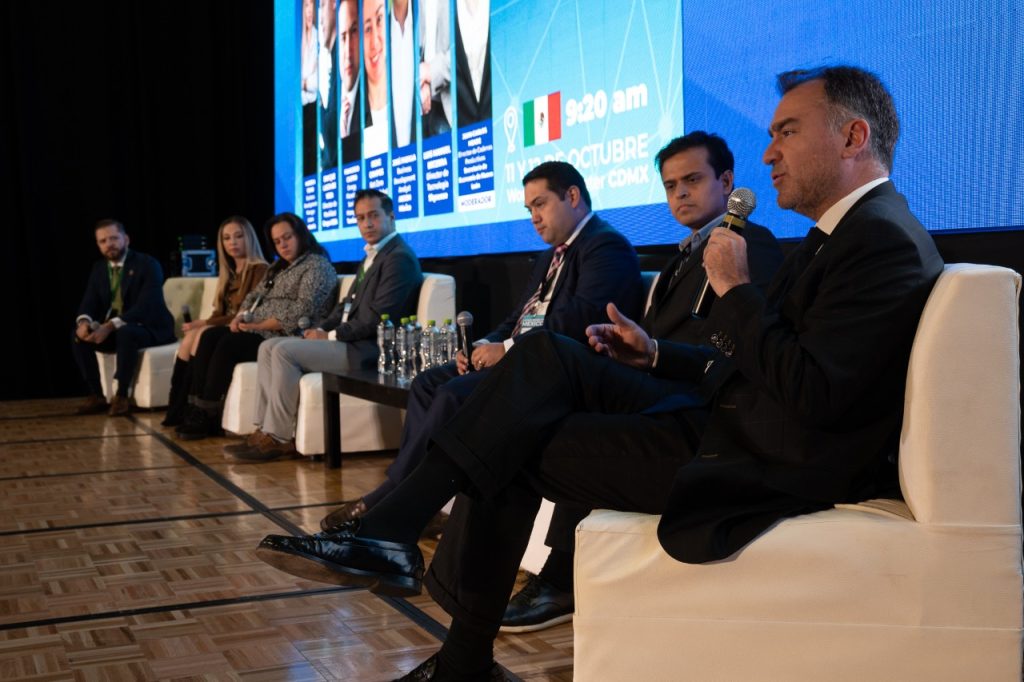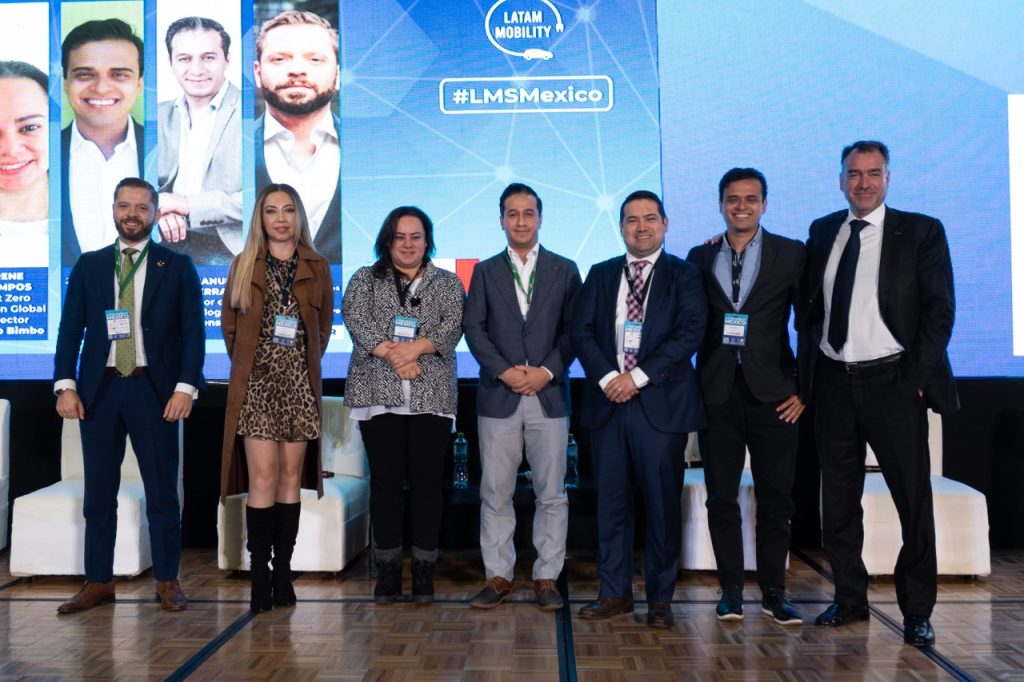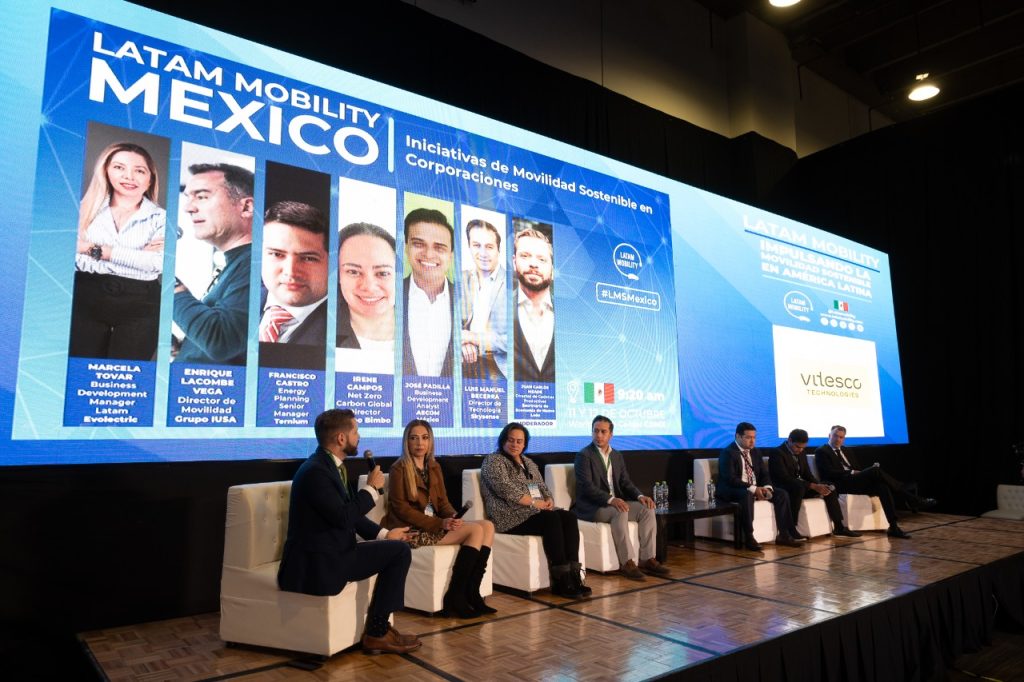“Latam Mobility: Mexico 2022“, a face-to-face meeting organized by Latam Mobility, the largest community in Latin America linked to sustainable mobility, brought together representatives from the public and private sector who gave advances on the current situation and challenges of mobility and sustainability in Mexico and the region.
The first panel on October 12, entitled “Sustainable Mobility Initiatives in Corporations“, was attended by Marcela Tovar, Business Development Manager Latam of Evolectric; Enrique Lacombe Vega, Mobility Director of Grupo IUSA; Francisco Castro, Energy Planning Senior Manager of Ternium; Irene Espínola Campos, Net Zero Carbon Global Director of Grupo Bimbo; José Padilla, Business Development Analyst of AECOM Mexico, and Luis Becerra, Technology Director of Skysense.
The panel was moderated by Juan Carlos Meade, Productive Chains Director at the Nuevo León Ministry of Economy, who indicated the need to implement sustainable initiatives, including the transportation sector, which is the second sector that generates the most emissions in Mexico, as well as to boost the different supply chains and comply with the aspects covered by the 2015 Paris Agreement.

Building the Ecosystem
Marcela Tovar, Business Development Manager Latam at Evolectric, a company in Los Angeles, California, USA, that develops retrofit technology for the electrification of commercial or cargo vehicle fleets, pointed out that they are currently developing a series of initiatives to drive decarbonization. “The important thing is to align. We have seen that companies are supporting, not only financially, but providing their fleets and resources to implement pilot projects where we apply new technologies towards meeting sustainable development goals.”
“At Evolectric we offer fleet retrofit technology that can become that next step in advancing the energy transition in the freight transportation sector. One of the advantages of retrofitting is that it extends the life of the vehicle with no environmental implications, zero emissions and in turn, supports the circular economy as it generates no industrial waste. We can represent an important step towards decarbonization in the transportation sector in Mexico and the region,” said Tovar.
Regarding the challenges of the sector, Tovar said that in Latin America there are regulatory challenges and a lack of knowledge of the technology. “It is very important to start promoting the generation of public policies that promote the insertion of new industries. There is great potential in Mexico to become a manufacturer and exporter, but this must be accompanied by support in regulations, academic training of new technicians and engineers, and the intervention of academia to expand knowledge. The challenge will be to generate the ecosystem around this new industry”.
You may also be interested in: Conuee, Énestas, Engie, Grupo Energía Bogotá, Naturgy and SkySense Analyze the Present and Future of Clean Fuels in Mexico
Concrete Plans
Enrique Lacombe Vega, Mobility Director at Grupo IUSA, a Mexican company with more than 80 years in the market linked to electrification, and which has had a unit dedicated to sustainable mobility for the last four years, said that “the future of mobility depends on collaboration between the different actors involved in the sector, from manufacturing to operations, software and distribution chains. We all have to do our part on the road to 2030 or 2040 where mobility is emission-free”.
Regarding today’s mobility business, Lacombe said the most important message for companies is that the model is sustainable. “Today, the total cost of ownership at three, four and five years is profitable. We have to start scrapping gasoline engines, we don’t have to wait long. We are already here, and I invite all the SMEs that have this intention to approach all the companies in the sector to see how we are working and implementing these new technologies.”
On the other hand, the IUSA Group representative pointed out the importance of defined plans. “In the case of Mexico there is a lack of many incentives and policy. The countries that have been successful, specifically in public transportation, is because they had the courage to enter, and when decisions are made, solutions to barriers are found, such as financing, or changing vehicles that are 15 and 20 years old on the streets. Of course it is going to cost, but all good things cost”.

More Determination
Francisco Castro, Energy Planning Senior Manager at Ternium, one of the largest flat steel manufacturers in Latin America that has the automotive industry among its main customers, said that internal changes have been made to encourage the use of sustainable mobility.
“We have changed paradigms, internally encouraging the use of electric vehicles and installing chargers in the plants, and we took the next step by changing part of our fleet of utility vehicles. Now we are facing the great challenge of transporting 20 tons of steel per coil. We are open to pilot programs and to continue advancing in our lines of action”.
On the other hand, the Ternium representative commented that “Mexico has the regulation to achieve the objectives, although there are conflicting opinions. On the one hand, we are on the right track to meet the Sustainable Development Goals (SDGs), but on the other hand, we are not. In the country we have everything to achieve it, it is just the will to do it, decarbonization is here and it is here to stay“.
Regulations and Incentives
Irene Espínola Campos, Net Zero Carbon Global Director of Grupo Bimbo, explained her company’s progress: “We have a well-defined sustainability strategy and we are committed to being net zero carbon emissions by 2050. Today we have 1,300 electric vehicles on all the streets of Mexico, and in six months we will have 1,000 more, to become the largest electric fleet in Latin America. It has been a journey that began for us in 2012, when new trends began to emerge”.
In addition, the Grupo Bimbo representative indicated that the company currently produces its electric cars, through its Vekstar brand. “We make vehicles that meet our needs to take them to market and generate data and drive new trends. Our Mexican engineers have developed four generations of vehicles through the subsidiary that are already a reality. We all have to put our grain of ‘flour’, private, public, academic and government sectors.”
Regarding the challenges, Espínola said: “As Grupo Bimbo we are proof that it is possible, and we need to move forward to promote incentives and that the government starts to generate regulations that include these incentives. In addition, it is necessary to move forward to realize what is lacking in infrastructure, both external and internal. We need to go in, and then question how we generate, how we drive it and how we develop it“.

Present and Future
José Padilla, Business Development Analyst at AECOM Mexico, a U.S. consulting firm with extensive installed capacity in the Aztec country, which was recognized by Fortune magazine as the sixth most admired company in the world, indicated that they collaborate with their clients not only in technological implementation, but also in technologies linked to ESG factors, and added: “Only when we combine an efficient operation with new technologies is when we can really aspire to have a much broader carbon reduction”.
On the other hand, Padilla explained that the company is carrying out its initiative called “Scope X“, in which all its designs are based on eliminating or reducing carbon emissions as much as possible. “We are completely convinced that migrating to new technologies is the present and future to contribute to climate goals.”
In addition, Padilla pointed out the scope of sustainable mobility. “It is important to remember that the goal is that it can reach all people, regardless of their economic status. We must think about collective, sustainable and equitable mobility so that really, both the technology and its operations are efficient and focused on sustainability.”
Paradigm Shift
Luis Becerra, CTO of Skysense, a company that develops energy generation projects (including green hydrogen) storage and applications, pointed out the need to move forward. “We are an ecosystem that has to start maturing. We believe that by 2030 in Latin America public transport in major cities will be able to start moving with hydrogen from major companies that have clear targets. To do this, roadmaps and government regulations are required to allow the entry of the different sectors.”
“Among the barriers are investment and infrastructure, but another must be mentioned: the price of conventional fuels. We have to make a paradigm shift, and see it as an issue of energy independence. At SkySense what we do is to understand the needs of customers and provide a tailored solution, so that this transition can be accelerated,” explained Becerra.
Finally, Luis Becerra pointed out that although green hydrogen is not currently profitable, work must begin to learn how it works and promote its use in sustainable mobility, both in Mexico and throughout Latin America.
Below is the video with the presentations and panels of day two of “Latam Mobility: Mexico 2022”




